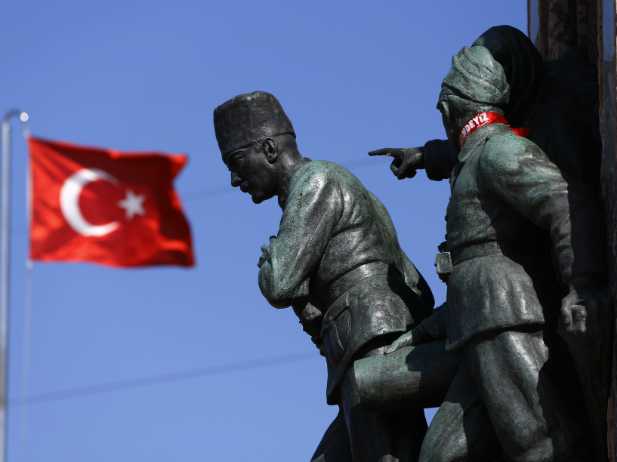As the closure case against the ruling Justice and Development Party (JDP) is moving towards a verdict in the Constitutional Court, the Turkish political agenda has become even more complicated with the arrest of a number of prominent individuals allegedly associated with a coup plot against the government. Although the JDP was able to win a decisive victory in the July 2007 elections following a serious dispute over the election of a new president, Turkish society has become even more polarized during the past year and tension is rising in an alarming manner. The gravity and implications of the crisis had been examined by Bulent Aliriza, the Director of the CSIS Turkey Project. Mark Parris, former Ambassador to Turkey in 1997-2000, who is currently a Visiting Fellows at Brookings Institution, then provided a commentary.
—————————–
Mark Parris Ne Diyordu?
ABD’ nin Ankara eski Büyükelçisi Mark Parris’ in Türkiye ile ilgili bir değerlendirmesi özet olarak Türk medyasında yer almıştı. Bugün, Cumhuriyet Gazetesinde yayımlanan ve bu konuda daha detaylı bilgi içeren Ergin YIldızoğlu’ nun köşe yazısını aşağıda gönderiyorum. Yabancı dili ingilizce olanlar, arzu ederlerse, aşağıdaki linkten M.Parris’ in konuşmasını kendi sesinden dinleyebilirler. Saygılar,
Bedii Nezih Oz
ERGİN YILDIZOĞLU
Mark Parris Ne Diyordu?
ABD’nin eski Ankara Büyükelçisi Mark Parris’in, Türkiye’deki siyasi krizle ilgili yorumları geçen hafta medyaya yansıdı. İlgiler daha çok, Parris’in Anayasa Mahkemesi’nin kararına ilişkin adeta bir tarih veren öngörüsü üzerinde odaklandı. Ama Türkiye’den döndükten sonra Stratejik ve Uluslararası Çalışmalar Merkezi’nde (CSIS) yaptığı ilginç konuşmanın içeriği, sanırım, yeterince irdelenmedi. Haberin üzerinden yaklaşık bir hafta geçmiş olmasına karşın konuşmada ilgimi çeken noktaları sizlerle paylaşmak istiyorum.
Mark Parris Türkiye’ye, bir ABD – AB ortak kuruluşu olan Atlantik Konseyi’nden bir heyetin parçası olarak gelmiş. Türkiye’de olup bitenleri anlamak, büyük olasılıkla etkilemek amacıyla gelen bu heyetin diğer üyeleriyle birlikte Türkiye’de yaygın temaslarda bulunmuş. Parris, dönüşünde CSIS’de yaptığı ve basında aktarılan toplantıdaki (kuruluşun web sitesinden dinlemek olanaklı) yaklaşık 20 dakikalık sunuşunda ve izleyen “Soru-Cevap” bölümünde, özellikle üç noktaya yaptığı vurgunun çok önemli olduğunu düşünüyorum: AKP’ye yönelik eleştiriler, “3. Güç” dediği bir yapılanmaya ilişkin saptamalar, Türkiye’de siyasetin içinde askerin rolünün artacağına ilişkin beklenti.
AKP başarılı olamadı
Parris’in AKP’ye, ikinci dönemi bağlamında yönelttiği eleştiriler oldukça kapsamlı. Bunlardan en önemlileri şöyle: AB sürecini canlandıramadı, anayasayı değiştiremedi, varlığından kaygı duyulan İslamcı gündemin/projenin (“agenda” sözcüğünü kullanıyor) keskin yanlarını törpüleyemedi, tüm ülkenin başbakanı olamadı. Nihayet yolsuzluk sorunu AKP grubunu da etkisi altına aldı.
AB sürecinin aksamasının tek sorumlusunun AKP olmadığını, AB’nin değişen tutumunun süreci fiilen öldürdüğünü göz önüne alırsak, Parris’in, aslında AKP’nin kendisinden istenenleri veremediğinden yakındığını düşünebiliriz. Bence daha önemli eleştiriler AKP’nin toplumda birleştirici olamadığına, dolayısıyla bölücü olduğuna, yolsuzluklara bulaştığına ilişkin saptamalarda yatıyor. Böylece Parris, diplomatik bir dille, AKP’nin meşruiyeti üzerine bir soru işareti koyuyor. Dahası, sermaye sınıfı ve Batı yanlısı liberal seçkinlerle AKP arasındaki ilişkinin bozulmasına yaptığı gönderme, AKP’nin Batı yanlısı tutumunun, liberal demokrat olma iddialarının hakikiliğine ilişkin kaygıların bir yansıması olarak görülebilir. Bu saptamalara karşılık konuşmasında sık sık Tayyip Bey’i övmesini, “Yeri doldurulamaz” demesini “Hatalarından öğrenmiyor” saptamasıyla birlikte okuyunca, aklıma efsanevi Kızılderili Şefi Jeronimo’nun “Beyaz adam çatal dillidir” sözleri geldi, ister istemez.
‘3. Güç’e dikkat
Bence, konuşmada çok az yer verilmekle birlikte, Parris’in karşı karşıya olan güçleri sıralarken bir “3. Güç”ten söz etmesi çok önemli. Parris, bugünkü kriz içinde, Tayyip Bey’den yana tutum alan bu “3. Güç”ün sivil güvenlik güçleri, istihbarat örgütleri içinde çok etkin olduğunu ve kendi savcılarına sahip olduğunu söylüyor. Diğer bir deyişle Parris, devlet içinde, şiddet organlarında ve yasama içinde, kaynağı belirsiz (“biz bile bilmiyoruz” demeye getiriyor) karanlık bir güç var diyor. Bu gücün “cemaat” olduğu artık herkesin malumudur. Öyleyse Parris, bu güce işaret ederken “cemaat”in etkisiyle, devletin elindeki şiddet tekelinin parçalanmaya başladığını da söylemiş oluyor. Böylece, Parris, devlet içinde bir “tırmanan darbe” (devleti ele geçirme) olgusuna dikkat çekmiş olmuyor mu?
Askerin siyasi rolü artacak
Bence, Parris’in, askerin siyasi etkisi artacak öngörüsü, AKP’yi destekleyerek akıllarınca “militarizme karşı” mücadele ettiklerini hayal eden şaşkın liberallerin üzerinde şok etkisi yapmalıdır. Tabii duyduklarını anlayacak kadar akılları kaldıysa. Parris son dönemde en “aklıselim” yorumların ordu üst kademesinden geldiğine inanıyor. Parris’e göre, önümüzdeki dönemde, “asker-siyasetçi” olarak nitelediği bir kategorinin sivil siyaset içindeki rolü özellikle, Özkök gibi emekli komutanların aracılığıyla artacak. Yine Parris’e göre ordu üst kademesinin, asker siyasetçilerin, sivil siyaset içindeki etkisinin artmasıysa, AKP’yi geriletmeye çalışanlara karşı mücadele eden güçleri daha da güçlendirecek, onlar için bir nevi koruyucu etken olacak. Bu da “başkalarını” düş kırıklığına uğratacak gibi görünüyor.
Tam bu noktada Parris’in; “Taraflar bir çıkış yolu bulamazlarsa uçuruma birlikte yuvarlanacaklar”, “Ancak görünürde bir taviz verme ya da anlaşma eğilimi yok”. “Birileri bu sorunu çözmeli” yorumu üzerinde düşünmeye başlayabiliriz. Düşünürken benim aklıma, İngiltere dış politikasının önemli düşünce kuruluşu Chatam House’dan Fadi Hakura’nın, bir saptaması geldi “Erdoğan ve AKP’ye ne olursa olsun, Türkiye, ideologların geçmiş dönemdeki kavgalarının biriken küllerinden doğacak yeni bir tarz siyasetin eşiğinde” (17/07/08). Hımm.
erginy@tr.net




